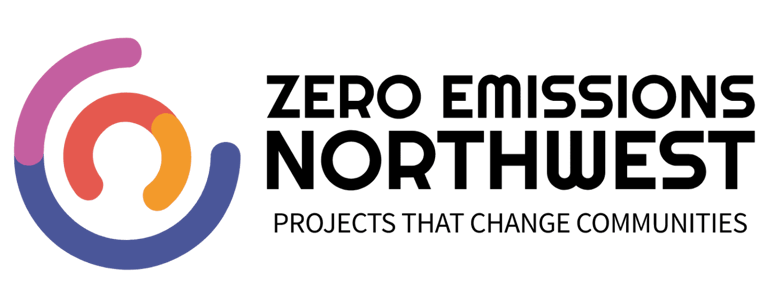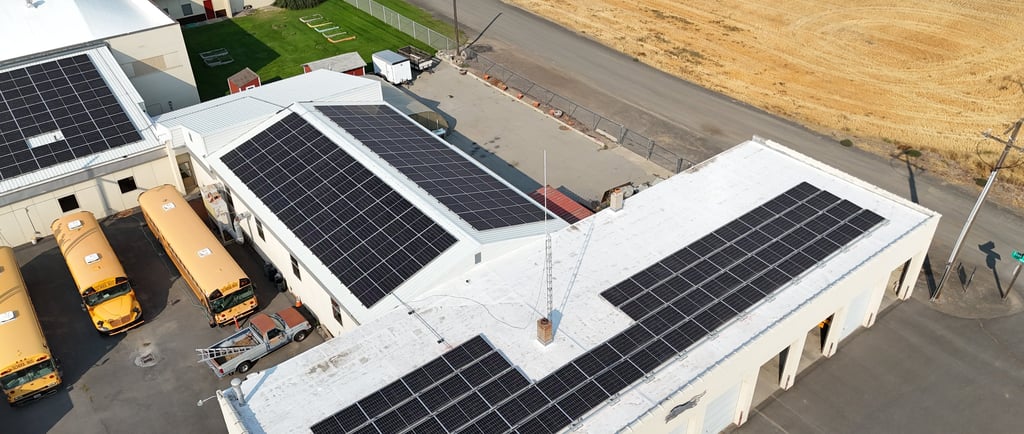Harrington School: Solar Energy Gives Schools more Resources and Decarbonization
Using one-time incentives from the Community Solar Expansion Program, solar systems will be installed on or near school buildings at no cost to the school district.
11/20/20254 min read
SOLAR WASHINGTON, November 8, 2025 -- Zero Emissions Northwest (ZEN), Partners for Rural Washington (PRWA) and Washington State University (WSU) Extension are collaborating to help rural school districts and their communities save by installing solar power. Solar Washington interviewed ZEN President David Funk to learn more about the program.
Funding Comes from Washington State
Using one-time incentives from the Community Solar Expansion Program, solar systems will be installed on or near school buildings at no cost to the school district.
WSU is the administrator of the program, David explained. Their job is to coordinate with the utilities to make sure they're not over-promising or over-allocating. They also provide ZEN with interpretations about the legislation they're administering. PRWA is ZEN’s strategic partner. ZEN also partners with the Rural Development Council for Washington, which helps communities of 5,000 people or less.
“We want to do as many schools as possible, David said.” However, although the state says there is $25 million per biennium, it's actually limited by the utility’s tax liability. If a utility pays a million dollars in state public utility tax, for example, that's the ceiling for money the state will provide.
School Selection
In deciding which schools to select for the program, ZEN wants to have the greatest impact, which they define as the most districts, students and financial value.
And beyond the financial and environmental benefits of solar, David said the program has other advantages. Once a community has solar and starts seeing the financial benefits, it's contagious. “We've seen this with residential solar, where one house goes solar on a street and three others follow. We've even seen this in Harrington. When we installed solar on the school, eight homeowners in Harrington called the solar company. This is a town of 250 people.”
Funding is Essential
David said the CSE program provides the majority of the funding for their projects. At the same time, ZEN is looking to “value-stack” funding sources. Avista has a Named Communities Investment Fund, for example, which helps impoverished areas. PRWA has brought in partners such as Rural Climate Partnership. Another partner is the Washington Sustainable Energy Trust, which provides low-cost loans to small businesses. “When we look at the stack, it's all of these things.”
Funding is important for ZEN as well. David said the Washington State Green Bank is supporting ZEN’s financing through a first-loss position. “This is the first instance where the Green Bank is able to use their position to improve the financing considerations for small businesses and help to build these projects. Green Bank can play a crucial role in supporting smaller community solar projects.” Along with Green Bank, ZEN’s finance partners include Craft3 and Washington Sustainable Energy Trust.
Preparation for the Longer Term
David said he believes small school districts “don't have money (for solar) today. They won't have money in 5 years, 10 years, or in 20 years. They're all bandwidth-constrained, whether it's the front office, the superintendent or the facilities management staff. They don't need another toy to take care of.”
While ZEN started as a technical advisor to the schools, David said that it is now the developer, financier and interim operator. “We're trying to bridge that gap between how you install this and how we transfer ownership over to the right folks.”
ZEN is using insights from the first school supported under the program, in the Harrington School District, to enhance future installations and make managing solar easier. David said ZEN addresses potential issues with its solution. “We do all the work up front. We let them take asset ownership. Then, we focus on long-term warranties so we're not giving them a problem in 10 years if an inverter breaks. We try to acquire spare panels, so we can easily swap out a broken panel and not worry about a new voltage or shape difference. That is the better approach to panel maintenance.”
What David wants to see going forward is solar on municipal buildings such as schools and town halls. “Those are the opportunities where public financing and support like the WSU incentive program can come in. We can have a multiplier effect. Every dollar that WSU puts into a project can turn into $345 dollars’ worth of value. The school district doesn't need to get as much money to pay their utility bills.”
Multi-faceted Benefits
WSU has pre-certified 15 schools. David said they would have built their fourth project by the end of October 2025 and then will build more in the 1st quarter of 2026. “Our goal, with what we have in the pipeline, is to build it all next year and then think about follow-on projects for each of those schools.” As an example, he said ZEN plans to submit Harrington into the Clean Energy Grant for a battery project to make it into a resilience center for the town and the neighboring community. “If we could tap into other parts of funding and create more value for those communities, that's what PRWA and I want to do. If we are successful at winning that incentive for Harrington,” he said, “that becomes a replicable concept for any one of our other communities.”
ZEN looks at the benefits of the program from a variety of perspectives, David explained. “What we're really doing is reallocating budget from the utility line item to their community line item. Many of these schools already have programs where they help their community. It might be a free and reduced lunch program, and they can make that a free lunch program. Others will probably want to create their own offerings. There are opportunities to bring in members of the community to say what's going to be most impactful.”
PRWA wants to build a menu of programs and services that a school district could look at, he said. Giving the school board a menu can streamline the value and simplify it.
ZEN is also looking at how to train the school administrators and board so there is continuity even if there is turnover. “We need to make sure there's continuity of the program. ZEN also plans to develop a “solar project cheat sheet” to make following up easier.
As the discussion concluded, David said “it's been hugely rewarding to work in Eastern Washington in the ways that we have.” Along with delivering cleaner energy, installing solar will reduce school costs so that resources can be directed towards programs that directly benefit students and the broader community.
Full article by Solar Washington: https://www.solarwa.org/harringtonschool2025


